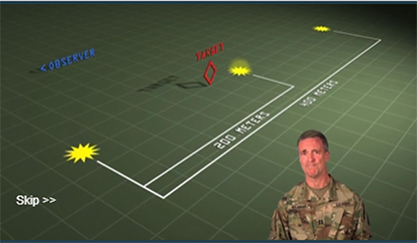Novel Applications Using Tech Behind Virtual Human Role-Players
The PeopleSim® logic engine presents versatile applications beyond traditional conversations. These applications encompass various aspects including:
1. Novel uses currently implemented and in practice.
Browser Rendered 3D Application
The WorkChat system, funded by NIMH (R44 MH123359-01), was developed to help transition-age youth with autism practice their soft skills in a work setting by repeatedly practicing conversations with virtual customers, coworkers, and supervisors. Our team integrated PeopleSim® into a 3D application developed using WebGL (Web Graphics Library), a JavaScript API (Application Programming Interface) that enables high-performance 2D and 3D graphics rendering directly within compatible web browsers without the use of plug-ins. Additionally, we developed a new feature in PeopleSim® that allow multiple conversations to dynamically influence each other and be collectively scored as a unified interaction.

Clinical Skills Assessment
With the support of NIH (R01 MH112625) funding, we developed the Cognitive Behavioral Therapy Skills Assessment, a project aimed at exploring the utilization of PeopleSim® as a clinical skills assessment tool, expanding on its traditional role as a training tool. Traditional certification methods for assessing clinician competency in applying CBT techniques can be demanding and reliant on dedicated evaluators. In contrast, our virtual assessments yield results comparable to those obtained through human evaluation. One of the key advantages of our assessment system is its ability to consistently apply standardized evaluation criteria to every individual, mitigating potential discrepancies in inter-rater reliability.
Spanish Language Adaptations
We are delighted to share that funding has been secured to convert some of our systems into Spanish, and the process is currently underway. Our team is diligently working on this initiative and have expanded our language offerings, with the expectations that we will translate more of our systems into other languages. This endeavor reflects our commitment to making our training accessible to diverse global audiences and further enhancing the impact of our solutions on a global scale.
2. Developed prototypes laying foundation for future innovations.
An Intelligent Tutor
We have taken PeopleSim® and reimagined its application to develop an intelligent tutor system. Originally designed for training conversational skills, we have used PeopleSim® to develop an intelligent tutor prototype that provides personalized and adaptive tutoring experiences. This intelligent tutor can assess individual learning needs, deliver tailored instruction, and track progress in real-time. With our intelligent tutor, learners can benefit from personalized guidance, interactive exercises, instant feedback, and a dynamic learning environment. With many training practices moving from the classroom to online, having a tutor available to support learners as they complete an exercise is a valuable SIMmersion asset.

Adapting Technology for Prompt-Free Systems
Our team has successfully repurposed PeopleSim® to create prompt-free systems. These systems are designed to accommodate a diverse range of spoken learner statements without relying on specific scripted prompts. We have developed two notable prompt-free systems to showcase the versatility and potential of this approach.
The first system is geared towards regular safety checkups, enabling users to initiate automated phone conversations. This system can effectively respond to various learner inputs without the need for specific prompts. It demonstrates the potential of building automated phone response systems that can adapt to a wide range of learner interactions.
The second prototype focuses on testing EMS operators' reactions during crises, requiring a deep understanding of EMS procedures.
Both prompt-free systems exemplify our commitment to innovation and the adaptability of our technology. By eliminating the need for explicit prompts, these systems empower learners to engage in natural and spontaneous conversations, providing a seamless and user-friendly experience. We continue to explore the potential applications of prompt-free systems across various industries, revolutionizing the way learners interact with automated systems.
Murder Mystery Game
The game “Who Killed Poppy Rose” is a murder mystery game with six possible suspects, each of whom may have committed the murder. Talking to the suspects, and listening carefully to what they say, will lead to successfully finding the killer.

VR Headset Application

This prototype was co-developed with a software company specializing in virtual reality (VR) to demonstrate how PeopleSim® could be easily integrated into a VR environment.
Installable 3-D Application
The Attack Aftermath system, developed in 2016, utilizes the Unity cross-platform game engine and requires a download for installation. In order to seamlessly integrate PeopleSim® with the Unity game engine, our team developed the Conversation API. This innovative API enables easy integration and collaboration between PeopleSim® and Unity, allowing for a comprehensive and immersive 3D experience in the Attack Aftermath system.
Language Assessment
A prototype online language assessment system was developed for a private organization.
Historical Figures

A prototype of a conversation with Thomas Jefferson was created and demonstrated PeopleSim®’s ability to capture a historical presence. Reviewers reported that they felt the presence of President Jefferson. The script was based on his many written words.

